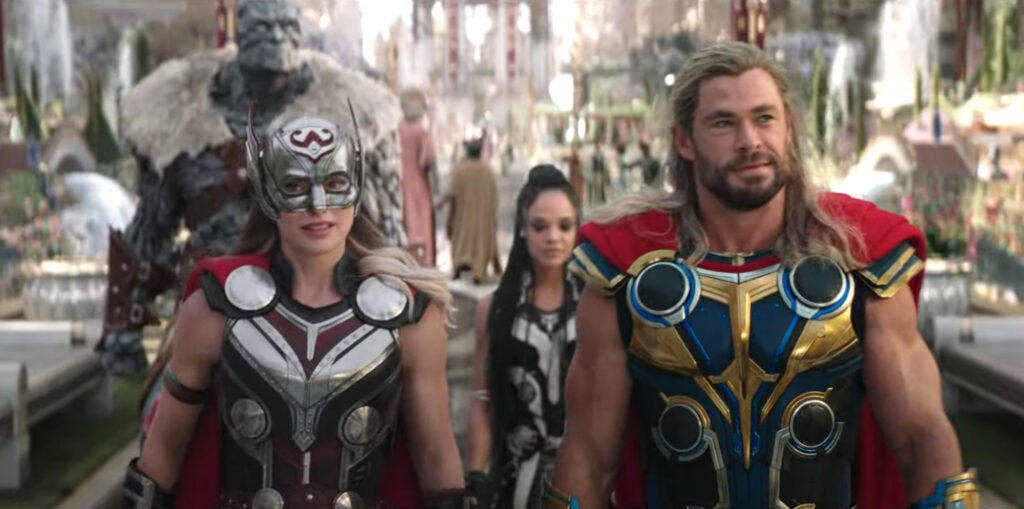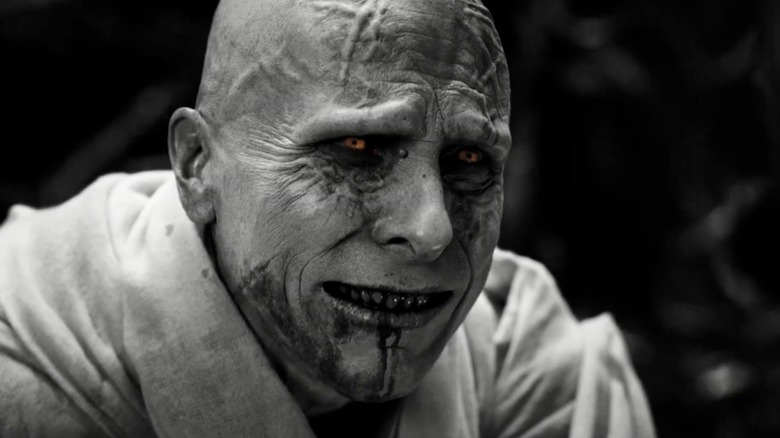Genre: Superhero
Premise: Thor must team up with his ex-girlfriend, also Thor, to save a bunch of children who’ve been kidnapped by an evil supervillain who is moodily flying around the universe killing gods.
About: Thor 4 opened with 143 million this weekend which is a number the industry doesn’t really know what to do with. They like giant or minuscule numbers that fit into easy narratives but as we’ll talk about today, this isn’t an “easy narrative” movie. The film is the biggest opening ever for a Thor film (good) but 45 million short of the last Marvel film, Dr. Strange (bad). An overlooked story with Thor, which admittedly has a lot of much bigger headlines to talk about it, is Taika’s screenwriting choice. Nobody’s ever heard of screenwriter Jennifer Kaytin Robinson before. So good on her for convincing the director to give her a shot.
Writer: Jennifer Kaytin Robinson and Taika Waititi
Details: About 2 hours long

I’ve noticed that people have been pounding their fists in the internet sand demanding for the magical ‘batsh#t crazy’ (as Chris Hemsworth called it) now mythical 4 hour cut of the film that was originally edited together.
I am happy to say that Taika has finally responded to these people demanding the “Taika Cut,” telling them what I’ve been telling everyone for the past two decades, which is that directors cuts are always terrible and that the theater cut is the best cut of the film.
Which begs the question: Is this cut actually good?
A quick plot recap first. This God named Gorr, played by Christian Bale, is hunting down a bunch of Gods because they’re responsible for killing his daughter. And Thor is next.
So Gorr heads to a place called New Asgaard, which, if I’m to understand this right, is a tiny theme park on earth that simulates where Thor is originally from? I think. Anyway, Gorr kidnaps all the children who are there that day and takes them to his planet.
Thor, then, teams up with Valkyrie, rock-monster Korg, and Jane, his old girlfriend, who now happens to be Thor, because she was dying of cancer and read somewhere that the Thor hammer makes you super-healthy or something. So she goes to New Asgaard to get the hammer and, in doing so, becomes Thor and cures her cancer.
Now when Captain America was able to pick up the Thor hammer, he didn’t automatically become Thor so… I’m not sure what’s going on there. But the point is, Jane, aka Thor, joins Thor, Valkyrie, and Korg on their journey to rescue the children.
On the way there, they try to recruit Zeus, since, you know, Gorr’s going to be coming after him next. But that fails miserably. Which means they’re going to have to go it alone. I’ll leave it up to you to guess whether they succeed or not.
I know that in this love it or thunder it era, you’re not allowed to have nuanced feelings about films. But I don’t know how you discuss Thor: Love and Thunder without having a nuanced take. Because there are some really bad things in this movie. But there’s also really good stuff too! So it’s hard to lay it over the “terrible” barrel and give it a spanking. It hasn’t misbehaved enough to do so.
Let’s start with the really good, which is Christian Bale. I feel bad for Bale because this may be the best acting job he’s ever done. I mean that. And it’s going to be lost in a mid-tier Marvel movie. The opening scene where he loses his daughter is heartbreaking. The following scene where he kills a God is mesmerizing. And any scene he was in after that was captivating.

However, Christian Bale is in a completely different movie from everybody else, starting with Thor. Thor is in Dumb and Dumber. That’s really what I would compare this to. It’s Marvel’s version of Dumb and Dumber. Except instead of Jim Carrey and Jeff Daniels, we get Chris Hemsworth and Natalie Portman.
What’s so baffling about Natalie Portman is how bad she is in this movie. But what’s even more baffling is that any of us thought that wouldn’t be the case. Portman had zero chemistry with Hemsowrth in the FIRST two Thor movies. Did we all think that Taika had some magical dust he would be able to sprinkle over them that would change that?
You can’t change bad chemistry.
And it’s weird how Portman’s delivery of this fast-and-free go-with-the-flow character comes off so forced. This is how she came into the industry, playing a can’t-shut-up 13 year old temptress who belts out non-stop dialogue like air (Beautiful Girls). Why does she seem so uncomfortable doing it here? She basically destroys any scene she’s in.
As for Thor, I guess they’ve gone full comedy with him. There are no more attempts to even pretend this character should be taken seriously. He’s cracking jokes no matter how close to death he gets. And it undercuts any tension that desperately tries to help this movie work. I felt higher stakes in The Hangover than I did Thor: Love and Thunder.
For example, Takia made this bizarre decision to give Thor a hologram video call ability whereby he could pop into the captured kids’ cage whenever he wanted and crack a bunch of jokes so they stayed calm. And Im thinking, “Do they realize how much suspense and fear and tension this choice destroys?” By showing us a visual of him and the kids hanging out, making jokes, you are showing us that the protagonist has succeeded a full hour before he’s succeed. It’s like you don’t want us to worry even a little bit.
I’m not going to lie. That threw me.
As a screenwriter, one of your mandatory jobs — especially in big budget Marvel movies — is to build as much doubt as possible into your story. The goal must seem impossible. When you do this correctly, we are desperate to keep watching because we have no idea how our characters are going to succeed. We watch to see them figure it out against all odds.
So I don’t know why you would deliberately eliminate all doubt. I suppose I understand that Thor is a full-on comedy at this point. But like I said, I had more doubt that Stu, Allen, and Phil, would find Doug than I did Thor would save these kids.
If you look back at Indiana Jones – the first one – Indiana Jones cracked jokes. It’s part of what made that character so charming. But he didn’t do it EVERY SINGLE LINE. He did it every few scenes or so. That way, when he *did* do it, it had impact.
If we know a joke is coming out of a character’s mouth every single time they speak, you lose that impact that a good joke has. Which means that, now, the jokes have to be EXTRA GOOD to land, because they’re competing against hundreds of other jokes. And that was another problem with this movie. The jokes just weren’t landing.
I will give it to Taika, though. He took big swings. He did so with a major character having cancer. He had a magical mystery tour bus that flew on rainbows and was driven by giant screaming goats. One of his characters was a rock man who lost his entire body and his face was taped to the back of another character. He’d do weird things like crash his characters into a 1960s model of a planet, breaking the filmmaking 4th wall.
It was as if he said, “Every time we come to a fork in the road, we are always going to pick weird.” I love that attitude. It’s better than the other route, for sure.
The most important question to come out of all of this, of course, is “Has Taika lost his magic touch?” Since I’m resting the future of Star Wars on his shoulders, that answer matters to me. I was terrified, after hearing some bad reviews of Love and Thunder, that the Taika train had been relegated to the maintenance track. But I think I understand what happened here. He made Ragnanok. And Ragnarok was perfect. But he didn’t want to repeat that. He had to have a challenge to stay interested in the franchise. So he said, “I’m going to push things further than I’ve ever pushed them before and treat it as a giant experiment.” And that’s why I feel safe with Taika and Star Wars. I think this was an experiment for Taika and he had a blast.
I didn’t have a blast with him. But I left the theater entertained.
[ ] What the hell did I just watch?
[ ] wasn’t for me
[x] worth the price of admission
[ ] impressive
[ ] genius
What I learned: There was a clever use of exposition here. Taika and Robinson had Korg tell a story to children about where Thor was in his life to deal with a lot of information that the audience needed to know (you can hear an abbreviated version of this in the Thor trailer). This is way better than trying to force expositional dialogue into a casual conversation. But what I really liked about this choice was that they used it to set up another important expositional chunk of information. When Jane shows up into the movie, we immediately go back to Korg now telling the story of Jane. When I say they used the first story to set up the second, what I mean is, this Jane exposition story scene doesn’t work if we didn’t have the first one with Thor. The audience would’ve been confused. So I thought that was really clever that they got a 2 for 1 there. The other day I was talking about how you can tell a writer’s improving by how invisible his exposition is getting. And this is a good example of that.

